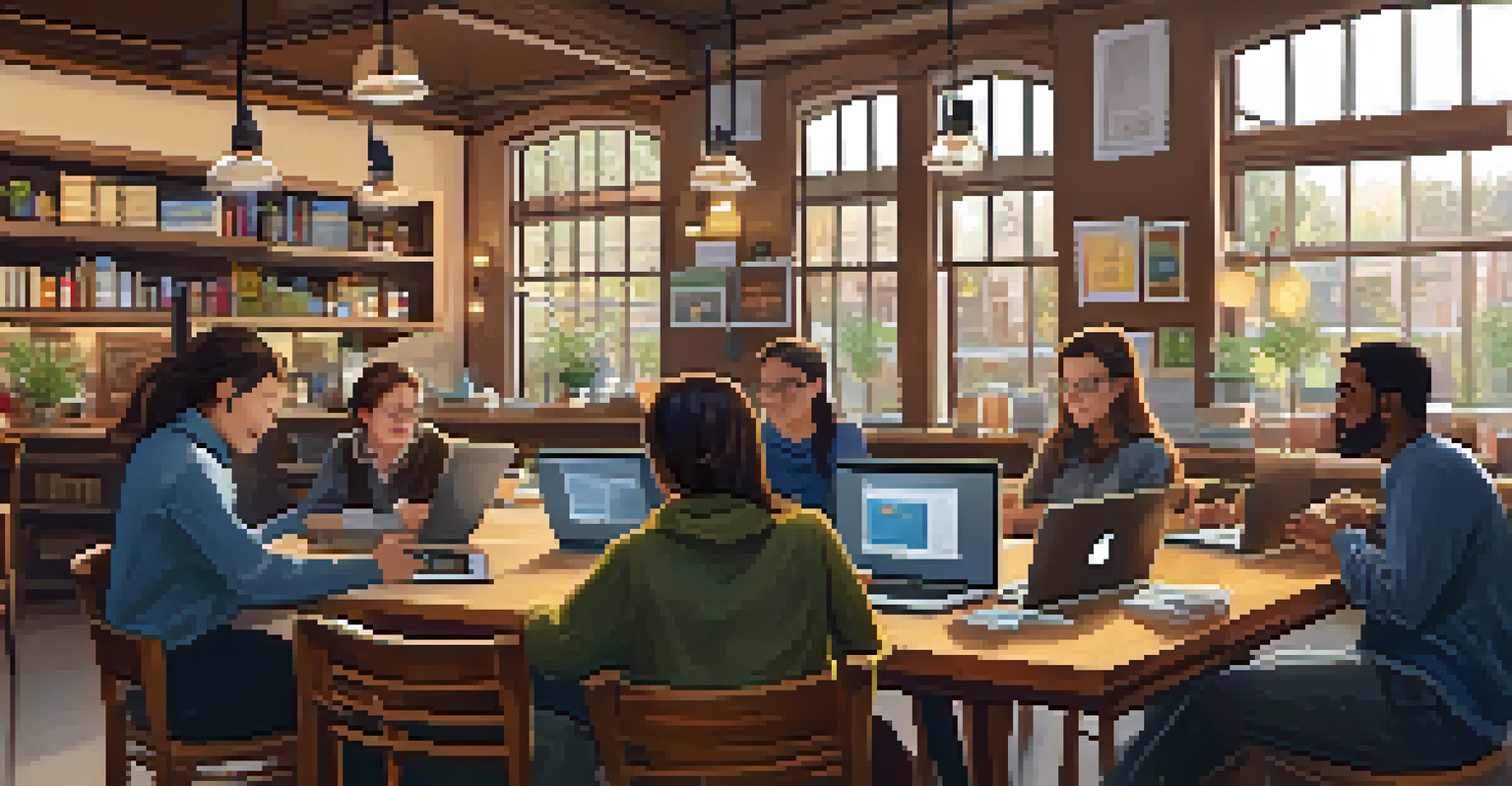Encouraging Lifelong Learning Mindsets in Educators

Understanding the Importance of Lifelong Learning
Lifelong learning is the continuous, self-motivated pursuit of knowledge. For educators, this mindset is crucial, as it not only enhances their personal growth but also enriches their teaching practices. Just like a gardener nurtures plants, educators must tend to their own intellectual growth to foster a thriving learning environment for their students.
Education is the most powerful weapon which you can use to change the world.
In today's fast-paced world, the landscape of education is constantly evolving. New teaching methods, technologies, and theories emerge regularly, making it essential for educators to stay informed. By embracing lifelong learning, educators can adapt and innovate, ensuring they meet the diverse needs of their students.
Moreover, when educators model a commitment to lifelong learning, they inspire their students to adopt the same mindset. This creates a culture of curiosity and resilience, where both teachers and learners are eager to explore, question, and grow together.
Creating a Supportive Learning Environment
A supportive learning environment fosters collaboration and encourages educators to pursue professional development. This can be achieved by creating spaces where teachers feel safe to share ideas, experiment, and even make mistakes. Just as a cozy coffee shop invites conversation, a welcoming atmosphere in schools can spark innovative discussions among educators.

Administrators play a vital role in establishing this environment by providing resources and opportunities for professional growth. Workshops, mentorship programs, and peer collaboration can offer educators the tools they need to enhance their skills. When educators feel supported, they are more likely to engage in lifelong learning.
Lifelong Learning Empowers Educators
Embracing lifelong learning enhances educators' skills and inspires students to adopt a similar mindset.
Additionally, celebrating achievements—big and small—creates a culture of recognition that motivates educators to continue their educational journeys. Acknowledging progress, whether through formal awards or simple shout-outs, can significantly boost morale and encourage further exploration.
Encouraging Self-Reflection and Goal Setting
Self-reflection is a powerful tool for educators seeking to improve their practice. By regularly assessing their strengths and areas for growth, they can set achievable goals that align with their professional aspirations. Think of this process as a compass guiding them through their educational journey.
Live as if you were to die tomorrow. Learn as if you were to live forever.
Goal setting encourages educators to take ownership of their learning. Whether it's mastering a new teaching method or learning a new technology, having clear objectives helps them stay focused and motivated. This structured approach to personal growth can lead to significant advancements in their teaching effectiveness.
Moreover, sharing reflections and goals with colleagues can create accountability and support. When educators discuss their aspirations, they open doors for collaboration and encouragement, fostering a community of lifelong learners who uplift one another.
Leveraging Technology for Continuous Learning
Technology has transformed the way we access information and learn. Online courses, webinars, and educational platforms provide educators with a wealth of resources at their fingertips. This digital age allows teachers to learn at their own pace and convenience, much like browsing through a vast library from the comfort of home.
Incorporating technology in professional development not only enhances learning but also equips educators with the skills they need to integrate these tools into their classrooms. As they become more tech-savvy, they can model these practices for their students, creating a more engaging learning experience.
Supportive Environments Boost Growth
Creating a collaborative and safe learning environment encourages educators to pursue professional development.
Additionally, social media and online communities offer educators the chance to connect with peers worldwide. Sharing insights, strategies, and experiences can lead to richer discussions and broaden perspectives, further fueling the lifelong learning mindset.
Cultivating a Growth Mindset
A growth mindset, popularized by psychologist Carol Dweck, is the belief that abilities can be developed through dedication and hard work. This mindset is essential for educators as it encourages them to embrace challenges and view failures as opportunities for growth. Much like a sculptor chiseling away at marble, educators can refine their skills over time.
Encouraging a growth mindset within educational institutions fosters resilience among educators. When faced with obstacles, they are more likely to persevere and seek solutions rather than give up. This persistence not only benefits their professional journeys but also sets a powerful example for their students.
Moreover, recognizing and celebrating effort, perseverance, and improvement reinforces this mindset. When educators appreciate the journey of learning, they create a positive feedback loop that motivates them and their students to strive for excellence.
Building Collaborative Learning Communities
Collaborative learning communities are powerful networks where educators can share knowledge and resources. These communities can take various forms, such as professional learning communities (PLCs) or informal groups that meet to discuss teaching strategies. Just like a team of explorers sharing their findings, educators can learn significantly from one another.
Through collaboration, educators can engage in peer observations, feedback sessions, and joint planning. These interactions not only enhance their teaching practices but also foster a sense of belonging and support. When educators feel connected, they are more likely to invest in their own learning and development.
Administrators Foster a Learning Culture
Effective leadership from administrators is key to establishing a culture that values and prioritizes lifelong learning.
Furthermore, these communities can lead to the emergence of mentorship opportunities, where experienced educators guide newcomers. This cycle of learning and sharing strengthens the profession and cultivates a culture of continuous improvement.
Highlighting the Role of Administrators
Administrators play a crucial role in fostering a culture of lifelong learning among educators. Their support and vision can create an environment where professional growth is prioritized and valued. Just as a captain steers a ship, effective leadership guides educators toward their learning goals.
By providing resources, training, and opportunities for collaboration, administrators can empower educators to take charge of their professional development. Investing in their staff's growth not only enhances teaching quality but also boosts morale and retention rates.

Moreover, administrators should lead by example, showcasing their commitment to lifelong learning. When educators see their leaders actively pursuing knowledge and skills, they are more likely to follow suit, creating a ripple effect of growth throughout the institution.